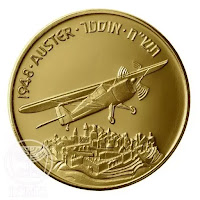A JUNKYARD TREASURE
Born in 1916, Alex Zioni was a member of the Haganah in his youth. When WWII broke out, Alex volunteered for the British Royal Airforce, where he eventually attained the rank of Major.
In November 1947, he was
appointed, in secret, as the Chief of Staff of the “air service” of the Haganah.
Not for nothing was Alex considered the founding father of the Israeli
Airforce. He invested all his time and energy in his new job and worked towards
a detailed programme of how the future Airforce would function - from the
minute the new state would arise.
From the beginning of 1948,
the military situation in Israel was desperate. The “air service” was in its
early stages and consisted of only a few light planes. The British were busy
withdrawing their army and armaments from the Yishuv (Jewish Palestine).
Amongst the surplus military equipment they were auctioning off, were 20 wrecked,
one-engine light planes, called Austers.
Early in January 1948, a
light plane from the Israeli airforce club appeared in the sky. When the pilot
was given permission to land, Alex Zioni presented himself to the commander of
the British base as a representative of the Jewish Agency. He explained that
the Jewish Agency is interested in purchasing the plane wrecks purely for
civilian use.
When he added that he was a
former member of the Royal Airforce, it made a favourable impression on the
commander. of the British base - who agreed to allow him to examine the planes.
They looked like pieces of junk, but Alex knew that the “air service” would
consider them a veritable treasure.
The officer responsible for
the auctions viewed Alex with suspicion and asked a lot of questions. He then demanded
the astronomical sum of 10,000 lira - which Zioni succeeded in reducing to
7,500. The officer hesitated, and in the end said: “I agree, but on two
conditions. First, that the money will be on my table within one hour and
second, that I will be able to buy, in another few months, one functioning
plane from the Jewish Agency”.
Someone
else would have thrown up their hands - but not Alex. He ran like a madman all
the way to the building of the Jewish Agency, burst into the office of finances
and told the astonished employees that it was a matter of “life or death”, and
that they need to let him have a huge sum of money, immediately. After deferring
to higher authorities, the large safe was opened, and almost emptied out. Alex rushed
all the way back, and placed a large bag of money on the table, in front of the
astonished British officer.
The following was no less
dramatic. Over 20 trucks acquired by the “airforce service”, were loaded with
every wrecked plane and spare parts - which were piled onto the trucks. Just
before setting off, literally at the last moment, an emergency situation arose.
The Arabs, who heard that
the Jews were taking out tens of planes , began an uproar which didn’t take
long to reach Jerusalem, and even to London. Just before the convoy began to
move, the Jewish commander received a frantic telephone call from the British
airforce headquarters in Israel. “Stop the convoy! The deal has been called
off!!”
The officer from the “air
service” sat in the commander’s office, on whose desk lay the documents authorising
permission for the planes to leave the base. He had heard the conversation,
and was sure the game was up. He was able to breathe a sigh of relief when the
local British commander informed the general in Jerusalem; “I’m sorry sir.
They’ve already left the base”.
At the end of January 1948,
the trucks arrived at a deserted Templar underground wine cellar in the small
village of Sharona. The whole campaign was carried out in complete secrecy, and
in extremely stressful circumstances. The British could have discovered them at any time. At the end of two months of intensive non-stop work on the planes,
supervised by Alex, the technical teams succeeded in rehabilitating 14 Austers
from among the 20 wrecks.
The Auster planes have been commemorated twice. On a stamp by the
artist Eliazer Weisshof, and from the “Coin and Medallion Co.” - one of the 14
medallion series called “Aeroplanes that have made history”.
In the words of Yitzhak Sadeh (commander of the Palmach and one of the founders of the IDF) “If Zioni had not succeeded in organizing the Auster planes when the Arabs invaded Israel, the state of Israel would not have arisen, and the Yishuv would have been annihiliated”.
Alex finished his army
service in 1960, and continued to work for the good of Israel in a number of
fields. In 2021 - at the age of 107 - he was awarded the rank of Colonel in an emotional ceremony.
When asked what he has to
say to the people of Israel as it approaches its 75th anniversary, he answered:
“The words of the Israeli anthem that express expectation and hope for the
future - when we would become a free people in our own country, should be
changed. We are already a free and proud people who live in sfety in our own
country”



Comments
Post a Comment